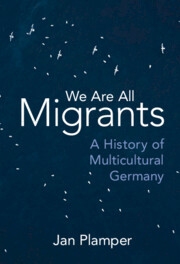1 - We Are All Migrants, Almost Everywhere, Almost Always – Especially the Germans
Published online by Cambridge University Press: 16 March 2023
Summary
The German lands – a nation-state came into being only in 1871 – were a major world region for outmigration until the middle of the nineteenth century. This chapter tells the story of emigration from Germany, highlighting parallels between how German immigrants were treated abroad and how immigrants in Germany were, and indeed are, being treated. It begins by showing how migration had always been a reality for Germans. After that it turns to the United States and Russia, the two main destinations of emigration, especially during the mass migration in the 1800s, making Germans the United States’ largest ethnic group. With poverty and religious and political persecution as main push factors, Germans on the move were subjected to discrimination, even racism, physical violence, and pogroms. They reacted by hyper-assimilation or retreat into ethnic communities, particularly from the early 1900s onwards when hybrid identities – German and American/Russian – came under threat from homogenizing nationalism. This history needs to be remembered so that Germans realize how quickly history can turn around: once a liability, a German passport today is coveted by many, but this may change.
Keywords
- Type
- Chapter
- Information
- We Are All MigrantsA History of Multicultural Germany, pp. 10 - 30Publisher: Cambridge University PressPrint publication year: 2023

